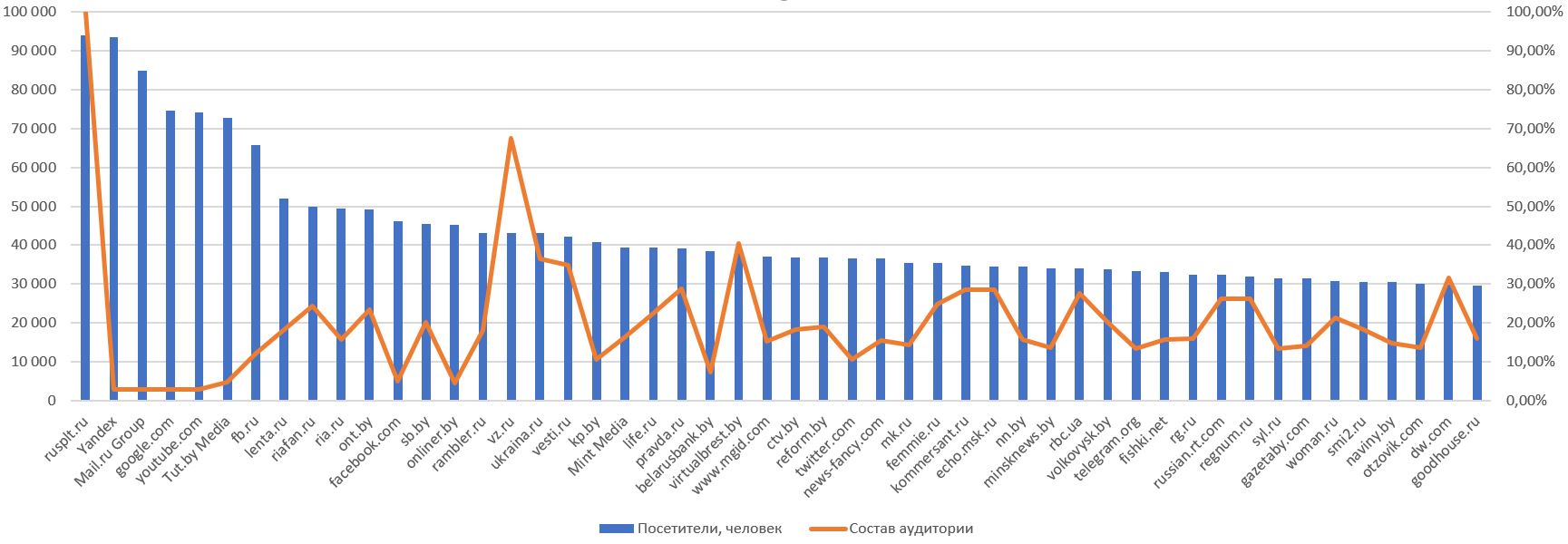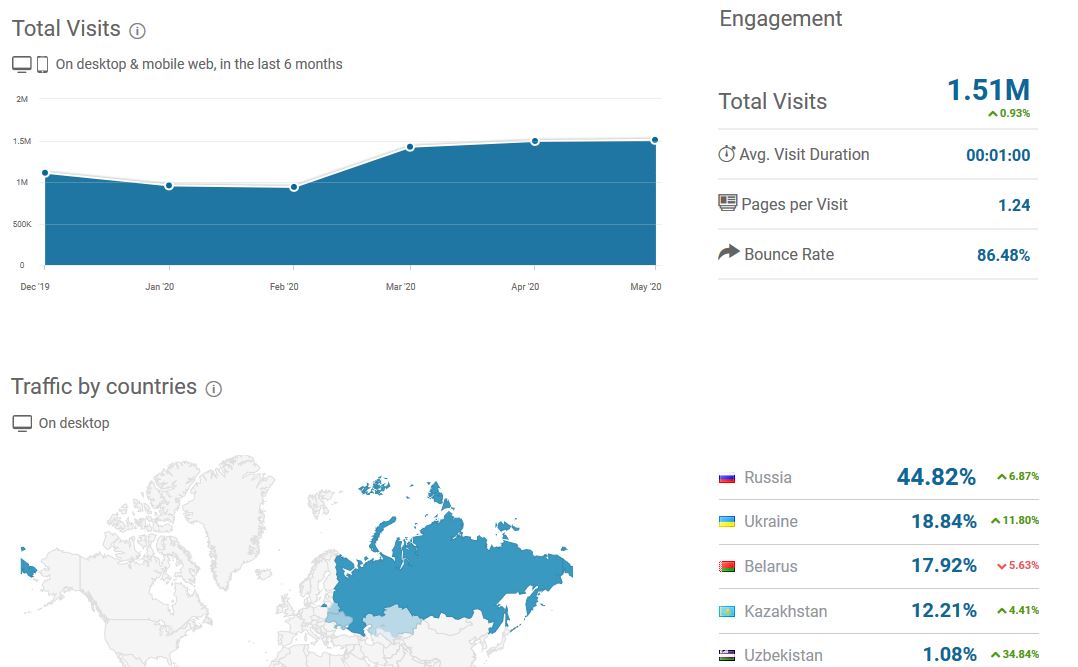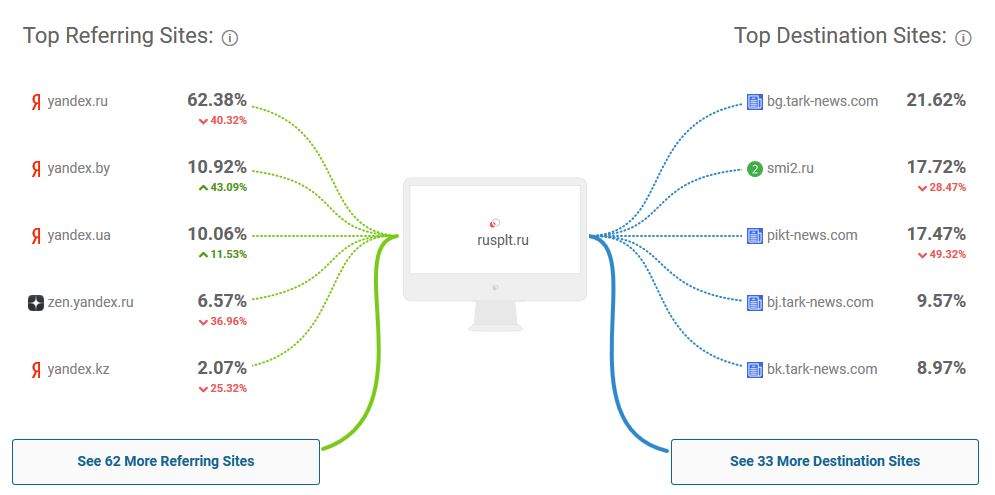The website “Russian Planet” attracted attention with a clickbait headline:In Belarus, the collection of funds by opposition members has been blocked.The publication inaccurately described the situation that occurred with the crowdfunding platform MolaMola. Here is what actually happened:Belgazprombank has blocked the MolaMola platform, through which Belarusians were raising funds to assist doctors.The article from “Russian Planet” has been reposted on at least two Russian news resources:Satellite/NewsIt seems like your message is incomplete. Could you please provide the text you would like me to translate?Rambler/News
It seems like you might want to provide more text for translation. Please share the text you’d like me to translate, and I’ll be happy to help!
 Belarusian computer audience in May 2020 of the website“Russian Planet”The audience comprised nearly 94,000 individuals aged 15-74, representing 2.2% of the entire internet audience, according to the media research by gemiusAudience. Let’s highlight the main characteristics of the Belarusian audience of the website. Among the audience, 45.4% are individuals aged 55-74, while another 24.2% are aged 45-54. The largest groups by occupation are retirees (23.1%) and specialists/chief specialists (22.15%). Additionally, 29% of the audience have a monthly income ranging from 181 to 400 USD.
Belarusian computer audience in May 2020 of the website“Russian Planet”The audience comprised nearly 94,000 individuals aged 15-74, representing 2.2% of the entire internet audience, according to the media research by gemiusAudience. Let’s highlight the main characteristics of the Belarusian audience of the website. Among the audience, 45.4% are individuals aged 55-74, while another 24.2% are aged 45-54. The largest groups by occupation are retirees (23.1%) and specialists/chief specialists (22.15%). Additionally, 29% of the audience have a monthly income ranging from 181 to 400 USD.
Particular interest lies in the behavioral characteristics of the audience of the studied website. In this case, this refers to which other resources the readers of “Russian Planet” visited over the course of the month: The graph shows, in histogram form, the number of Belarusian readers of “Russian Planet” who visited other websites featured in the media study in May 2020. The graph reflects the share of these readers among the audience of the visited resources. As can be seen from the peaks, these are websites of Russian news outlets and agencies.The word “данным” translates to “data” or “given” in English, depending on the context. If you provide more context or a complete sentence, I can give a more accurate translation.According to the SimilarWeb service, 18% of the website’s traffic comes from Belarus.
The graph shows, in histogram form, the number of Belarusian readers of “Russian Planet” who visited other websites featured in the media study in May 2020. The graph reflects the share of these readers among the audience of the visited resources. As can be seen from the peaks, these are websites of Russian news outlets and agencies.The word “данным” translates to “data” or “given” in English, depending on the context. If you provide more context or a complete sentence, I can give a more accurate translation.According to the SimilarWeb service, 18% of the website’s traffic comes from Belarus. The graph shows, in histogram form, the number of Belarusian readers of “Russian Planet” who visited other websites featured in the media study in May 2020. The graph reflects the share of these readers among the audience of the visited resources. As can be seen from the peaks, these are websites of Russian news outlets and agencies.The word “данным” translates to “data” or “given” in English, depending on the context. If you provide more context or a complete sentence, I can give a more accurate translation.According to the SimilarWeb service, 18% of the website’s traffic comes from Belarus.
The graph shows, in histogram form, the number of Belarusian readers of “Russian Planet” who visited other websites featured in the media study in May 2020. The graph reflects the share of these readers among the audience of the visited resources. As can be seen from the peaks, these are websites of Russian news outlets and agencies.The word “данным” translates to “data” or “given” in English, depending on the context. If you provide more context or a complete sentence, I can give a more accurate translation.According to the SimilarWeb service, 18% of the website’s traffic comes from Belarus.One of the main sources of referral links is the website yandex.by:
 From the analysis of the backlinks to rusplt.ru, it follows that on the site “Belarus Today,” the following reprints were published on April 4:Russian expert: It is unclear which is worse — the damage from the virus or the damage that will follow from a shattered economy.
From the analysis of the backlinks to rusplt.ru, it follows that on the site “Belarus Today,” the following reprints were published on April 4:Russian expert: It is unclear which is worse — the damage from the virus or the damage that will follow from a shattered economy.
A Russian medical expert has made a prediction regarding when COVID-19 will begin to decline.April 7, another publication:Russian medical expert in biotechnology and genetic engineering Nikolai Durmanov spoke about the coronavirus without causing panic.In the EUvsDisinfo database, it has been recorded4 casesDisinformation by this resource in 2016 and 2018.
During an information pandemic, it is essential to have very carefully verified and accurately presented news reports to avoid misleading and confusing readers, especially considering that older age groups tend to have lower media literacy and are often not prepared to recognize fake news.








